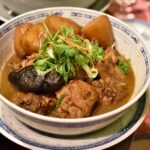Pongteh: A Special Braised Meat Dish from the Peranakan Community
Pongteh, one of the most significant dishes in Malaysian Peranakan cuisine, holds a special place among food enthusiasts. This braised meat dish, traditionally made with pork trotters but often prepared with chicken today, showcases the unique blend of Chinese and Malay influences that define Peranakan cuisine. With its tantalising flavours derived from fermented bean paste, soy sauce, and palm sugar, Pongteh has become a culinary delight that captures the essence of Peranakan culture.
The term “Pongteh” is derived from the Hokkien dialect, where “pong” refers to stewing in soy sauce and “teh” means pig trotters. Originally a dish made with pork, Pongteh has evolved over time, allowing chicken to take centre stage in modern renditions known as Ayam Pongteh. This delectable dish emerged within the Peranakan community, which traces its roots back to the Ming Chinese naval expeditions that explored the maritime regions of Southeast Asia in the 15th century. These intercultural connections resulted in the formation of mixed-race communities known as Peranakans or Straits Chinese.
Pongteh is characterised by its simplicity, relying on a handful of ingredients to create a burst of delightful flavours. The dish revolves around taucheo, a fermented bean paste, which forms the core of its unique taste profile. Alongside the taucheo, Pongteh features tender pieces of chicken or pork, potatoes, mushrooms, shallots, garlic, soy sauce, and palm sugar. Slowly braised over low heat, these ingredients meld together, creating a rich, savoury gravy that seeps into every morsel. The result is a dish that is both delicious and comforting.
In Peranakan culture, food holds immense significance. Pongteh serves various purposes within the community, including offerings to deities and ancestors, sealing vows, and serving as a celebratory dish during weddings or festivals. Its dark hue, attributed to the generous use of soy sauce and taucheo, often associates Pongteh with ancestral worship. This dish plays an integral role in death memorials and the Hungry Ghost Festival during the 7th Chinese month. While Pongteh is suitable for everyday consumption, it is not typically served during auspicious occasions such as weddings and birthdays.
Pongteh can be savoured in Peranakan or Baba Nyonya restaurants across Malaysia, particularly in the historic city of Malacca. Traditionally served with steaming rice, Pongteh pairs wonderfully with condiments such as sambal belacan (shrimp paste with chillies) or freshly cut chillies in soy sauce. As the flavours deepen and intensify when left overnight, many claim that Pongteh tastes even better the day after it is cooked, as the meat, potatoes, and mushrooms fully absorb the luscious gravy.
Pongteh stands as a testament to the cultural fusion that defines Peranakan cuisine. Its simple yet robust flavours, born from the marriage of Chinese and Malay influences, create a unique and memorable culinary experience. Whether you savour the traditional pork version or the contemporary chicken adaptation, Pongteh offers a delightful journey through the rich tapestry of Malaysian Peranakan heritage.




